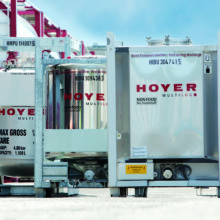
The terminal has now been lengthened by 220 metres and equipped with a second portal crane. New transhipment points and new storage capacities have also been created. Going forward, this public terminal will be able to process up to 110,000 cargo-handling operations per year. Considerably more full-length trains can be accommodated, and turnaround times shortened.
Ulrich Grätz, Director Supply Chain Solutions at HOYER and Managing Director of the KTSK Kombi Terminal Schkopau GmbH, said: “The demand exists in the region, and enquiries from existing and new customers wanting to use the terminal confirmed our decision to carry out the enlargement. The terminal has undergone constant further development since it was commissioned.”
During the one-year construction phase, the logistics company lengthened each of the two tracks to 620 metres and installed a second container portal crane. The transhipment area was enlarged by nearly 2,000 square metres. This enables the turnaround of up to 25,000 more load units per year than in the past. The new crane, weighing 370 tonnes and 26 metres high, and manufactured by Kranbau Köthen GmbH, has a maximum safe working load of 40 tonnes under the spreader, a maximum lift height of 14.90 metres and a maximum lifting speed of up to 30 metres per minute with a full load.
HOYER, which owns the terminal, also decided to increase the storage area in Schkopau by 3,500 square metres. Ingo Wiese, Director of the Hamburg logistics specialist’s Techlog business unit, explained: “This enables us to meet the growing demand by ship-owners and haulage contractors for empty container depots to serve the hinterland.” The terminal now also offers a repair service for box containers from overseas traffic.
